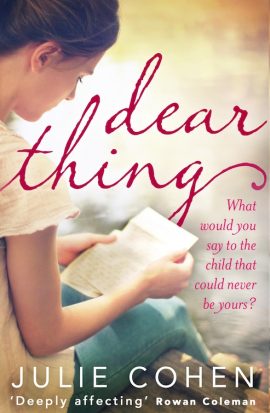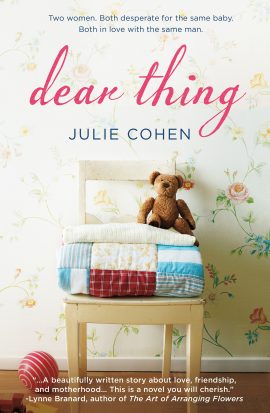More Praise for Dear Thing
"A tender and poignant novel, with characters that come right off the page" Abby Clements
"That rare thing: a true pageturner" Kate Harrison
"A powerful, heartbreaking story" Miranda Dickinson
"Both powerful and thought provoking, this wonderful book will move you to the core - and really make you think." Sun
Excerpt
‘Do you have children?’
Claire shifted slightly on Lacey’s sofa to face the woman who was talking to her. She didn’t know most of the women in the room. Two of them were from school–Lacey had just started teaching geography last year, ironically to cover another teacher’s maternity leave–but the others were Lacey’s friends or family. All of the guests had been seated around the room according to birth sign; it was supposed to help break the ice and help them get to know each other.
‘No,’ she answered, doing her best to put on a gracious smile, as she always did when asked this question by someone who didn’t know. Today, it was a lot easier.
‘No wonder your skin is so gorgeous! All that sleep.’ The woman leaned forward. She had straightened hair and blue circles under her eyes. ‘˜Tell me. Do you get to go to restaurants?’
‘Sometimes.’
The woman let out a long stream of a sigh. ‘Oh, I dream of restaurants. Ones that have proper cutlery. And menus that aren’t designed for children to colour in.’
‘I get excited about a bowl of chips at the soft play centre,’ added the woman on the other side of Claire.
‘Tell me about it,’ said the first one. ‘Do you know how Paul and I celebrated our wedding anniversary? Tub of Hagen-Dazs at the cinema during a Disney film.’
‘I forgot about ours,’ called another woman from across the room. ‘Harry and Abby both had the chicken pox. I remembered two days later and it hardly seemed worth it.’
‘Does your husband give you flowers?’ the first woman asked Claire.
‘Er…sometimes.’ There had been a bouquet on the table when she came downstairs this morning.
‘I got flowers for Valentine’s day last year!’ said the second woman. ‘Ellie ate them. We had to go to A&E. I didn’t get flowers this year.’
‘Were they poisonous?’
‘We were mostly worried about the cellophane wrapper. She didn’t do a poo for three days. I was terrified.’
‘Once, Alfie didn’t do a poo for two weeks. I shovelled enough pureed prunes into him to choke a horse.’
‘You have all this to come,’ said the first woman to Lacey. Lacey sat in a flowered armchair in the sunny, cramped front room of her flat, her hands laced over her protruding stomach. She smiled as if the idea of shovelling puréed prunes into a baby’s mouth was just about the best thing in the entire world.
Claire thought that probably wasn’t too far from wrong.
‘Wine?’ Lacey’s mother, who was a sweet lady with very red hair, was circulating the room with a bottle of pinot grigio. Claire shook her head and held up her glass, already full of mineral water. ‘That’s a beautiful cake you’ve made,’ Lacey’s mother said. ‘And so delicious. Aren’t you having any?’
‘Thank you. And no, I don’t really eat cake.’
‘Are you gluten-free?’ asked the first woman. ‘˜No wonder you’re so slim. I just look at a piece of bread and I gain half a stone.’
‘I just try to eat healthily,’ said Claire. ‘˜But I love making cakes, so.’
‘What’s the baby going to be called?’ someone asked Lacey.
‘We’re calling him Billy.’
There was a collective sigh of appreciation.
‘I like the simple names,’ said the first woman. ‘˜There are too many trendy names around. There’s a girl at Alfie’s nursery called Fairybelle.’
The women launched into a discussion of their children’s names: what they were almost called, what they were glad they weren’t called, what they would have been called if they had been born the opposite sex. The woman whose daughter had eaten the cellophane off her flowers got up to use the loo and Georgette, the other St Dominick’s teacher, slipped into the place next to Claire.
‘I’m sorry,’ she murmured. ‘It’s all baby talk.’
‘It’s okay. I’m used to it. Besides, it’s Lacey’s day. She looks wonderful, doesn’t she?’
They both looked at Lacey. She was generally the sort of person who didn’t call much attention to herself: a hiker, a camper, a good teacher.
She looked wonderful.
‘Still,’ said Georgette, ‘˜I think that people could be a little bit more sensitive. Not everyone wants to talk about babies all the time.’
Georgette had two children. Claire remembered when the youngest had been born; it was about the time Claire herself had gone through her third and final IVF treatment that had been allowed on the NHS, before they’d gone private. Claire had been given an invitation to the christening, but there was a little hand-written note in it: I’ll understand if you don’t want to be around babies.
She hadn’t gone to the christening, not to avoid the babies but to avoid the understanding.
The women in this room were complaining about their lives, but underneath they were happy. Claire could almost smell it, with the nose of an outsider. They exuded warm yeasty contentment. It was the same way, she noticed, whenever women with young children got together. The conversation revolved around little sacrifices or disasters, about mishaps and made-up worries, but its function wasn’t to communicate information: it was to establish relationship. To mark out common ground.
We are mothers. We do battle with nappies and Calpol. Look upon our offspring, ye mighty, and despair.
The truth was, she would give up anything to be like the women in this room. She was tired of feeling the sharp stab of pain every time she passed a playground. That raw drag of yearning at Christmas. She was tired of feeling like a failure, once a month, like clockwork.
But that didn’t mean she wanted to talk about it. Or to be pitied.


